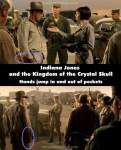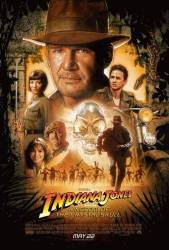
Continuity mistake: At the beginning when Indy is talking to Spalko, his hands keep alternating from being in his pockets to just resting at his sides between shots.

Directed by: Steven Spielberg
Starring: Harrison Ford, Cate Blanchett, Jim Broadbent, John Hurt, Ray Winstone, Shia LaBeouf, Karen Allen

Continuity mistake: At the beginning when Indy is talking to Spalko, his hands keep alternating from being in his pockets to just resting at his sides between shots.
Marion Ravenwood: I'm sure I wasn't the only one to go on with my life. There must have been plenty of women for you over the years.
Indiana Jones: There were a few. But they all had the same problem.
Marion Ravenwood: Yeah, what's that?
Indiana Jones: They weren't you, honey.
Trivia: When in the tent and forced to face the Crystal Skull, Indy dismisses the skulls as being from "Saucer Men From Mars". Indiana Jones and the Saucermen from Mars was actually an early title for the film.
Question: Perhaps I've forgotten some details from The Last Crusade in the years since I've seen it, but shouldn't Henry Sr. not be dead in this movie, because he drank from the Holy Grail which gives immortality?
Separate from membership, this is to get updates about mistakes in recent releases. Addresses are not passed on to any third party, and are used solely for direct communication from this site. You can unsubscribe at any time.
Check out the mistake & trivia books, on Kindle and in paperback.
Answer: Yep, you've forgotten some details. The Knight specifically states that the immortality bestowed by the Grail is limited to those who remain within the shrine. Jones Snr left the cave, ergo, no immortality.
Tailkinker ★